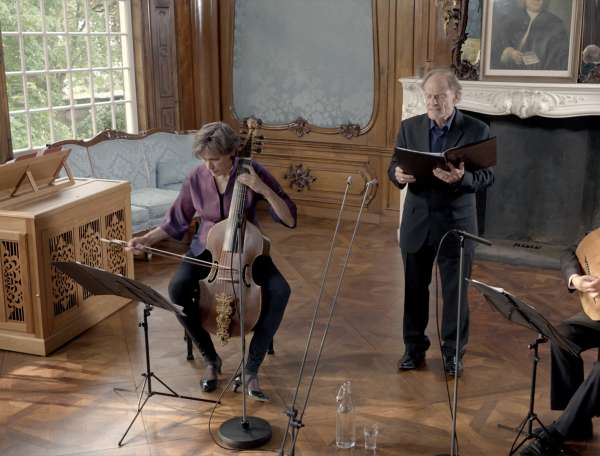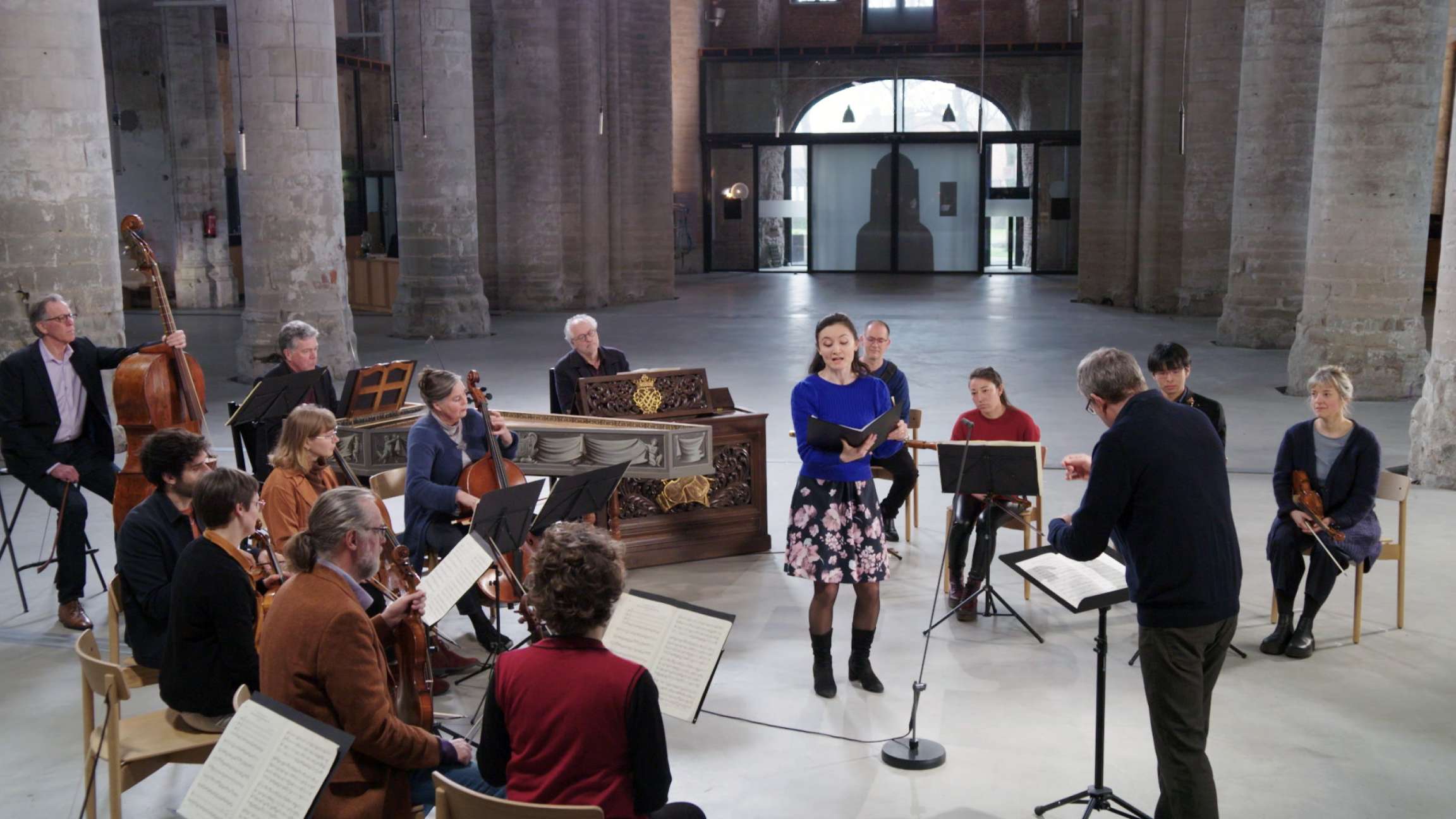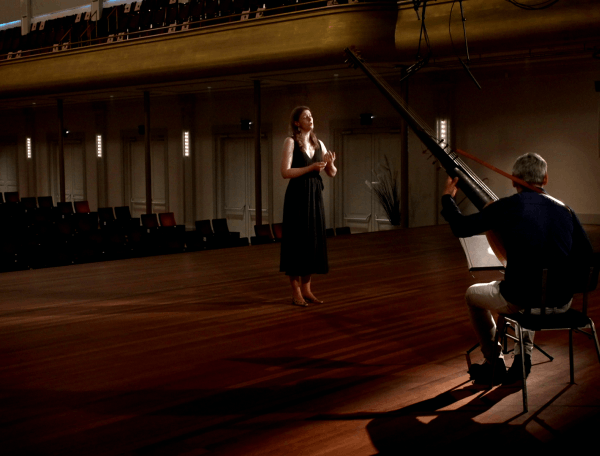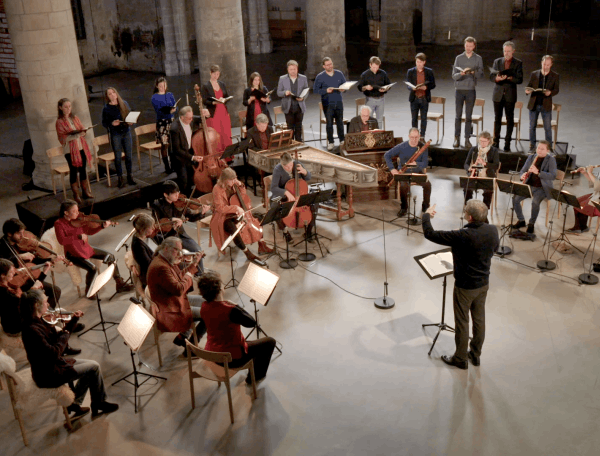

Alles mit Gott und nichts ohn' ihn
BWV 1127 performed by the Netherlands Bach Society
conducted by Hans-Christoph Rademann
Grote Kerk Veere
Behind the music
Just in time
A cheerful work that was discovered just before it was lost forever
A blessing in disguise. That is what you might call the survival of this strophic aria by Bach. The music was only discovered by a German musicologist in 2005, jotted down in Bach’s own hand on the last two blank pages of a short pamphlet from 1713 containing the printed text of the work.
The copy with Bach’s notes on it turned up in the Duchess Anna Amalia Library, in Weimar, the town where Bach was working in 1713. The poem in twelve strophes is a flattering occasional work for the duke’s birthday, and takes his motto as its starting point: “Everything with God and nothing without him”. The poem incorporates another clever trick, because if you take the first letter of a word in a set place in each strophe, they spell out the duke’s name “WILHELM ERNST”.
Bach thus tailored this piece. If he had performed it again during his lifetime, he would certainly have done something original with the acrostichon. Our recording of this piece was made possible by MWH4Impact. Hence, in this recording, we perform three stanzas centred on the letters M, W and H.
Bach’s cheerful music and key – he opted for C major – emphasise the festivity of the occasion. His chosen form, too, is rather more expansive (and thus more festive) than an ‘ordinary’ strophic aria, as those familiar to us from Schemelli’s Gesangbuch, for example. The voice is ushered in by an instrumental introduction, and instead of just a voice and basso continuo, each strophe ends with a refrain played by a full string ensemble.
So much for the blessing. And what about the disguise? The pamphlet in Weimar was temporarily removed from the library for restoration and research, along with similar occasional works. Shortly afterwards, in September 2004, a catastrophic fire reduced the library to ashes. After being lost for nearly three hundred years, Bach’s Alles mit Gott narrowly escaped never being discovered at all.
- BWV
- 1127
- Title
- Alles mit Gott und nichts ohn' ihn
- Instrument
- soprano
- Genre
- cantatas
With support from
Extra videos
Vocal texts
Original
Alles mit Gott und nichts ohn' ihn
wird einher manchen Segen ziehn.
Mein Gott, du kennest ja und zählest alle Schritte,
ach! höre doch, was ich im ganzen Leben bitte:
Nichts ohne dich, mit dir, mein Alles anzugehen,
so bin ich schon vergnügt, der Spruch wird feste stehen:
Soll einher mancher Segen ziehn,
alles mit Gott und nichts ohn' ihn.
Alles mit Gott und nichts ohn' ihn
wird einher Wundersegen ziehn.
Denn Gott, der Wunder tut im Himmel und auf Erden,
will denen Frommen, selbst, zum Wundersegen werden.
Der Mensch bemühet sich, will Wunder viel verrichten,
und voller Unruh ist sein Sinnen, Denken, Dichten.
Soll einher Wundersegen ziehn,
alles mit Gott und nichts ohn' ihn.
Alles mit Gott und nichts ohn' ihn
wird einher Himmelssegen ziehn.
Du, Gott des Himmels, kannst den Himmel ja erhören,
es kann dein Himmelsschoss Korn, Most und Öl bescheren, wenn Regen, Sonnenschein zur rechter Zeit sich küssen, wenn Erd und Himmel lacht und man wird sagen müssen:
Soll einher Himmelssegen ziehn,
alles mit Gott und nichts ohn' ihn.
Translation
All things with God, without him nought
will hither Many blessings bring.
My God, thou knowest, yea, and tellest all our footsteps, o hear me yet, hear what throughout my life I've prayed for. Nought without thee, with thee in all my undertakings, thus I e'en now am glad, that word will stand unshaken: Should hither Many blessings come, all things with God, without him nought.
All things with God, without him nought
will hither Wondrous blessing bring.
For God hath wonders wrought in heaven and on earth and would for the just himself become a wondrous blessing. Mankind is striving much, would wonders many fashion, and ever restless in its senses, thoughts, intentions. Should hither Wondrous blessing come,
all things with God, without him nought.
All things with God, without him nought
will hither Heaven’s blessing bring.
Thou, God of heaven, canst to heaven grant thy favor,
thy heav'nly bosom can grain, wine and oil apportion
when rain and sunshine have embraced in their due season, when earth and heaven laugh and we must all confess it:
Should hither Heaven’s blessing come,
all things with God, without him nought.
Credits
-
- Release date
- 7 March 2024
-
- Recording date
- 9 March 2023
-
- Location
- Grote Kerk Veere
-
- Conductor
- Hans-Christoph Rademann
-
- Soprano
- Kristen Witmer
-
- Violin 1
- Cecilia Bernardini, Pieter Affourtit, Anneke van Haaften
-
- Violin 2
- Lidewij van der Voort, Kano Imada, Mayumi Sargent Harada
-
- Viola
- Femke Huizinga, Ivan Jorge Saez Schwartz
-
- Cello
- Lucia Swarts, Anna Litvinenko
-
- Double bass
- Robert Franenberg
-
- Bassoon
- Benny Aghassi
-
- Harpsichord
- Siebe Henstra
-
- Organ
- Leo van Doeselaar
-
- Director and editor
- Bas Wielenga
-
- Music recording
- Guido Tichelman, Pim van der Lee, Lilita Dunska
-
- Music edit and mix
- Guido Tichelman
-
- Camera
- Martijn Struijf, Wesley Schipper, Jesper Blok, Bjorn Tiebout, Glenn van Eerden
-
- Lights
- Ernst-Jan Thieme, Martijn Schroeber, Jordi Kooij, Joey Marcoux
-
- Stylist
- Ellen Julianus
-
- Assistant director
- Ferenc Soeteman
-
- Assistant music recording
- Marloes Biermans
-
- Producer film
- Laura Jonker
-
- Producer concert
- Imke Deters
-
- With support from
- MWH4impact
Discover
Help us to complete All of Bach
There are still many recordings to be made before the whole of Bach’s oeuvre is online. And we can’t complete the task without the financial support of our patrons. Please help us to complete the musical heritage of Bach, by supporting us with a donation!

